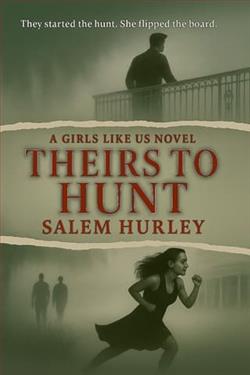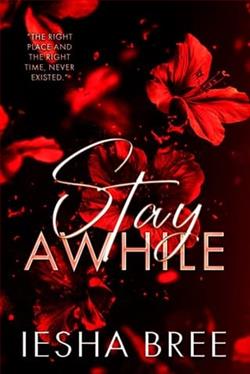Page 15 of The Nature of a Lady
Her smile took him back two years to that afternoon garden. It was filled with a dose of sunshine, the wonder of creation, the joy of questions still needing answers—but squeezed around the edges with the creeping vines of sorrow. Once he’d eventually realized with whom he’d had a conversation, he’d assumed the sorrow had been over her father’s recent death. And perhaps it had been.
But if so, she hadn’t yet managed to banish it, because those vines were still there. And while he loved a nice ivy-covered wall as much asthe next person, far too often vines were parasitic. Damaging. And sorrow was the same—it could sneak into the cracks of a person’s spirit and make them widen. Steal the nutrients needed. Compromise the foundation. Choke the very life out of a person.
And if there was anything worse than seeing a beautiful, healthy specimen killed by something that should have been removed by a careful gardener, he didn’t know what it would be.
Seemingly of its own volition, his hand lifted, as it would have done had she been any other islander instead of an earl’s sister. It landed on her shoulder, slid the length of her upper arm, and cupped her elbow. Something he’d done countless times with countless parishioners, all of whom had long ago learned not to be startled by the touch.
She clearly didn’t know it. Her eyes widened, her gaze sprang to his. But even then, when colored with surprise, the sorrow was there, twined around her.
“Why are you sad?” The words emerged as a murmur as his fingers found their places around her elbow. One could tell much about a person by their elbow. Whether it was plump or bony, tight or loose, how much tension they carried there. Hers spoke of youth and strength without pretention. Pointed, the muscles leading to and from firm. Covered with simple cotton.
She sucked in a long breath. Sometimes—rarely—people would look away when he asked such questions. Evade the answers they didn’t want to face. Sometimes—rarely—they would laugh away the basic human yearning to share, to be understood. He didn’t think Lady Elizabeth Sinclair would be the type to do either of those things.
And he was right. Her chin sank down a few degrees, but she didn’t break his gaze. “Because ... I was planted in a garden in which I don’t belong. And I don’t know how to flourish there anymore.”
He shook his head, his fingers tightening around her joint. “You are exactly where you need to be. The only place able to nourish your spirit.”
Her gaze wandered away then, but she wasn’t so much lookingfromhim as lookingtosomething else. Something not in this roomat all. Seeing, perhaps, the family that clearly indulged her. The home in which she’d passed so many happy years, discovering new joys even after all this time. Even her presence here, so far from her family, spoke of their love for her—otherwise they never would have let her come and explore.
She let out the breath she’d drawn in, just as slowly. “Maybe. But I can’t stay there forever. Expectations, you know.”
He did. Oh, how he did. They were their own set of vines, left all too often to squeeze and constrict and kill. But they too could be controlled. Trained into safe places. Used to climb instead of pull one down. “I have found that when a transplant is necessary, finding a new place for the plant ought indeed to be undertaken with great care. Sometimes the shock is too great for it, and it won’t survive. But other times ... other times it will flourish in its new environs far more than it ever did in its old.”
She blinked, her gaze falling to the floor. “How do you ever find such a place though? And how can you be sure you’re not consigning the plant to destruction?”
“There are never such certainties in life.” One never knew when a boat would overturn in a storm and steal one’s parents. When disease would eat away at one’s brother. When madness would steal one’s grandmother’s mind.
When the promise ofelsewould lure one’s sister away.
He gave her elbow a gentle squeeze. “This is why we don’t transplant anything until it’s necessary. But sometimes it is. And so, we learn what we can and make the best decision possible, do the work to the best of our ability, tend it with care. And we pray, trusting that the Master Gardener will bless our efforts.”
She looked at him again, her brows lifted, and, finally, a shaft of welcome amusement bloomed in her eyes and on her lips. “You pray for your plants?”
“Each and every one of them.” Both human and botanical.
She clearly understood the duality, given the sparkle in her eye. “Where exactly is your church, Mr. Tremayne?”
“I like to say all the islands are my cathedral, all the people my parishioners.” He gave her a grin. “I always sense God the best outside in His creation. But if one is being specific, I’m the vicar at St. Nicholas’s in Old Grimsby, on Tresco.” His uncle still lived in the parish house next to it. There’d been no need for him to move, not since Oliver was happy enough to stay at home. And now ... now home, and its perpetual lease, were his anyway.
Her smile was as sweet as nectar, though the vines hadn’t gone away. “Perhaps one Sunday this summer Moon and I will find ourselves on Tresco in time for services.”
“You are always welcome.” He let his gaze fall back to the envelope he still held. “She’ll boxmyears if I go opening her post.”
“Turnabout, then. If it was your book she wrote in.”
He liked the way good humor brought a lift to her alto voice. It made another smile tickle his lips, though thinking of Beth and strange letters by unknown carriers and odd writing in his book made him too aware of the heaviness.
Mamm-wynn had been right. Beth wasn’t where she ought to be. And yet here was something delivered to her. Well, let her box his ears for opening it, since it would mean appearing again to achieve the feat. He used a finger as a letter opener and ripped the top of the envelope. Peered inside, breath caught. Drew out...
A letter. “It’s about the cannonball.”
Lady Elizabeth had made no show of not watching him read. Her nose was scrunched, brows drawn together. “Does it say anything helpful?”
“I don’t know if it’s helpful or not. It says, ‘What we can verify for you is that it is indeed an eighteen-pound shot and that few ships that used Scilly as a base in the era in question were so equipped. But there is no way to verify the exact year or the exact ship, so it’s of no interest. Please focus upon the items in theCanary’s manifest.’” Oliver blinked at the page. “Manifest? Have you come across anything resembling a ship’s manifest?” And what was theCanary? He couldn’t recall any stories of a ship by that name, though that hardly meant anything.
Lady Elizabeth caught her lip between her teeth and shook her head. “Not that I’ve seen. Unless there’s one written on something in invisible ink.” She topped her jest with a crooked, uncertain smile.
“Mm.” He grinned back. “Probably unwise to put every paper in the house to a flame to test it. I don’t fancy burning up everything—that’s what happened last time I tried such a trick.” And his mother hadn’t been exactly pleased with him when he’d dropped the candle in shock and burned a hole in her favorite tablecloth either.















